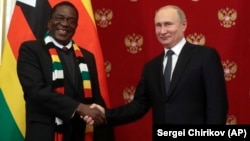Some of Zimbabwe’s opposition politicians and economists are skeptical about the outcome of Zimbabwe President Emmerson Mnangagwa’s trip to Russia for the Russia-Africa Economic Summit, in Sochi, based on past summits, where they say Zimbabwe did not gain much.
However, Zimbabwe government officials are expecting to make big gains, particularly in mining, where they say Zimbabwe has a lot to offer and Russia, a lot to gain.
Economist and former head of the Zimbabwe National Chamber of Commerce, Callisto Jokonya, said he expects big gains for Zimbabwe, given its mineral wealth, particularly gold and platinum, and Russia’s interest in growing its economy.
Jokonya said in addition to its nuclear program, Russia also has an advanced industrial base.
“It (Russia) buys a lot of minerals, and that makes for a strong relationship with a country like Zimbabwe which has a lot of minerals, provided that those minerals are processed in Zimbabwe,” said Jokonya.
Jokonya said President Mnangagwa’s presence at the summit is to ensure that Zimbabwe negotiates deals that will benefit the country, unlike past investments which have not benefitted citizens.
Jokonya said Russia has noted how countries like America, China and the European Union have developed their economies on minerals sourced from Africa, and wants to do the same, but this time, the agreements will be mutually beneficial to Zimbabwe.
“So now we want to make sure that our leaders, when they negotiate business, when they negotiate deals, we want them to examine if Africa is benefiting from these deals.”
However, Tendai Biti, a deputy president in the opposition Movement for Democratic Change and a former finance minister, challenged the notion that any viable business deals would come out of Russia, due to lack of trust of the country’s leadership.
“Nothing will come out of this talk show,” said Biti. “Since 2017 we’ve been hearing about these mega deals, mega deals, mega billions, but nothing has come out of them because there are trust issues and confidence issues.”
Economist Prosper Chitambara of the Labor and Economic Research Institute of Zimbabwe, said it would be wise for Zimbabwe to exercise caution in forging deals with Russia.
“You know in the past, Zimbabwe signed a lot of deals with lots of countries, but we’ve seen nothing substantive in terms of what we’ve signed with other investors. So that’s the first thing that should be done before we enter into other deals with Russian investors,” said Chitambara.
Asked what Zimbabwe needed to do to reap the greatest benefits from the deals, Chitambara said Zimbabwe should begin with creating a stable investment climate, backed by sound laws and policies.
“The problem currently facing Zimbabwe is that laws keep changing, what we call policy instability, policy inconsistency, policy instability,” said Chitambara. “And in addition to that, the cost of doing business in Zimbabwe, leading many investors to consider investing in Zambia or Mozambique,” Chitambara said.
“Let’s fix the number one problem in Zimbabwe, the issue of bad politics, the issue of beating people, the issue of theft,” said Biti.
He said, “We should communicate as a country and find solutions, as opposed to lying to each other and blaming it on sanctions.”
But Jokonya, said he disagreed with all opinions that saw Mnangagwa as throwing away good money after bad, by engaging in summits such as the one taking place in Russia.
Jokonya echoed the government positions that sanctions were to blame for Zimbabwe’s poor economy and lack of investors.
He said Russia offers a new opportunity for Zimbabwe, contrary to that of countries like America, which he claimed have imposed sanctions on the country and are intent on making Zimbabwe fail.
“We are now looking for new (partners) who look at us and think of us as a country that could help them with what they need, while also seeing what we could benefit from them,” said Jokonya.
“Personally, I don’t subscribe to the belief that we are wasting our time, I don’t think like that … Countries like America, that we’ve been at odds with for many years, have imposed economic sanctions on Zimbabwe.”
According to the organizers, the two-day Russia Africa-Summit, which is expected to host close to 50 African leaders, is the first event of its kind in the history of the Russian-African relations, where a joint document will be adopted after the Summit.
The summit theme is ‘Innovation Territory’, and is co-organized by Roscongress Foundation, the Russia-Africa Economic Forum and the Russian Export Center and Afreximbank.




